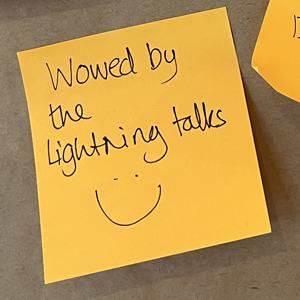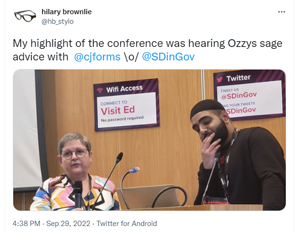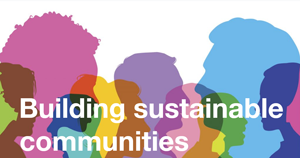
Last week at the Service Design in Government conference in Edinburgh, we tried a new format for this conference: Lightning Talks.
Four speakers responded to my call: Can you say something SDinGOV needs to hear? and we had a lively and varied session.
Many thanks to all the speakers, and to the attendees who created such a welcoming and interested atmosphere.
Catherine Reader talked about complaints and neurodiversity
Catherine Reader is a product manager at NHS Digital. She also identifies as disabled and neurodivergent. Find her on LinkedIn.
Her talk was “We don’t get any complaints about this”. She pointed out that disabled people find it hard enough to use government services without being given the additional burden of pointing out the problems to the service’s designers. In the past, she has herself been reluctant to complain. She asked us all to find out what the challenges are with our services in other ways, rather than relying on feedback forms, surveys, or expecting disabled people to speak up.
Usman (Ozzy) Anwar talked about lived experience in service teams

Ozzy chose to do his talk as an interview with me. I started by asking him about how he got his current job. He’s currently with the Ministry of Justice, working on services for prison leavers. He told us that he himself is a prison leaver, having experience of high security prison.
He said that he agrees that user research is important for service teams, but ‘it’s only the first chapters’ – having someone with lived experience within the team provides extra content and details that are hard to find from user research.
An audience member asked: “how can we welcome people with lived experience into our teams”, and Ozzy responded that it’s crucial to be authentic and truthful. For example, his experience is that prisoners know immediately if anyone isn’t being straight with them.
Imran Hussain talked about sustainable communities

Imran is the community manager for the Government Digital Service Design System. Find him on LinkedIn.
Vicky Teinaki captured themes from his talk in her tweets. For example a couple of highlights for me:
- A sustainable community is sustainable to run, but may not last forever. And that’s not a bad thing—life happens, people leave.
- Think about the flow of power – will it keep existing power structures or give some of it away? How you set up your community will affect this – harness the collective power of your community to get the benefits.
Imran’s slides are on Google docs: Building sustainable communities.
Andrew Knight invited us to consult on a document
Andrew ended the session with a ‘lightning consultation’ on a set of standards for policy design that people can use for:
- guiding their careers in policy design
- getting a job in policy design
- hiring people into the profession.
You can read the early draft document yourself – scroll down to standards for policy design (.pdf). Andrew welcomes feedback: policy.design@policyprofession.gov.uk
Armed with sticky notes for their comments, attendees spent one minute looking at the draft document on their own, either on their devices or on one of three giant printouts that Andrew brought with him. Then they paired up to compare views, and finally reported back in groups of four.
Thanks to all, and a final thought
I’m very grateful to a wonderful set of speakers, and to the generosity of the Service Design in Government attendees and the speakers who forgave my mistakes as an organiser. (Pro tip: try to get the names of ALL your speakers correct when you put them in slides.)
If you look at the call for speakers, you’ll see that I specifically asked people to join the session who are from “a group that is under-represented at conferences in general”. As it happens, I know that all five of us had good reasons to self-identify as from under-represented groups. Two of us (Catherine and Ozzy) chose to focus on their group in the session. Three of us didn’t – and that’s also absolutely fine.
If you are from an under-represented group, I hope you’ll feel encouraged to try some conference speaking. You may choose to talk about yourself and your experiences and that’s always great for people to hear. Equally, if you want to talk about something completely different then do that instead. What you have to say is important.
